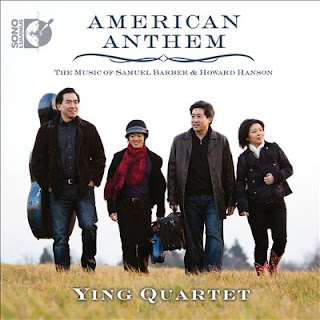The ballet begins, then, which a series of elementary choral block chords, a series of "aaahs" as it were, which to me seems a little too much on the movie music edge of things, rather undistinguished to my ears. But that fairly quickly becomes more subtle, quieter, as instruments enter now and again. Finally a solo clarinet announces the end and a new beginning as the choir takes over once again, this time with a modern-almost-Gregorian line punctuated by bells and chimes.
From here on in the music takes on character, more complex themes and development entering the fray. This isn't minimalism, but there is a stark facticity at times that has some of paired-down qualities of some of the more repetitious fare. By the middle of the third section there arrives a pulse on the mallets underneath choral "aahs" that have more sophistication to them, especially as punctuated by effective clarinet writing.
It has some rhythmic bite with an insistent figure in seven, articulated by the chorus and taken to a more directly driving end by percussion and winds. The Budapest Studio Choir and the Honved Male Choir have plenty of pep and enthusiasm but sometimes seem not quite up the the long "aahing" that is required of them, especially in the fortissimo zone. The Hungarian Symphony Orchestra conducted by the composer fares better. They often appear in smaller combinations, rarely tutti, but the parts are interesting enough and the playing has character fitting to the score.
Once we get to sections five through 14 we are on solid musical ground. There still are some "aahs" left but everything takes on a more inventive way, a more substantial melodic set of arcs, sometimes mysterious, all rather theatrical.
So if I as a listener simply started with the fifth section, I would have less to dislike. In the end Petitgirard has an originality, there is a spark of inspiration. Perhaps other works to come will fully satisfy me. As to The Little Prince there is good music to be heard but some of the choral writing/performance seems less than angelic, yet not really demonic either. As with all Naxos releases, you cannot beat the price. Unless you are a rabid Francophile this one is not essential.





















